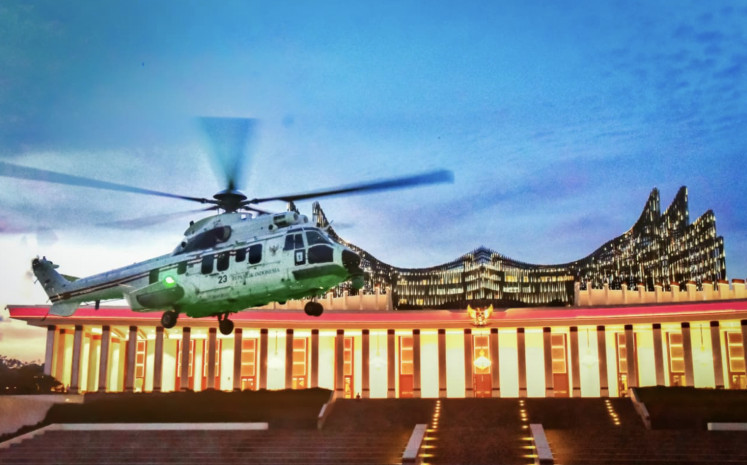Popular Reads
Top Results
Can't find what you're looking for?
View all search resultsPopular Reads
Top Results
Can't find what you're looking for?
View all search resultsRights abuse task force to be set up
The administration of President Joko âJokowiâ Widodo says it will establish a task force to seek resolutions to past human rights abuses, including the communist purge of 1965 that led to the deaths of thousands of alleged supporters of the Indonesian Communist Party (PKI)
Change text size
Gift Premium Articles
to Anyone
T
he administration of President Joko 'Jokowi' Widodo says it will establish a task force to seek resolutions to past human rights abuses, including the communist purge of 1965 that led to the deaths of thousands of alleged supporters of the Indonesian Communist Party (PKI).
Coordinating Political, Legal and Security Affairs Minister Tedjo Edhy Purdijatno announced the plan on Tuesday after a two-hour meeting with Law and Human Rights Minister Yasonna H. Laoly, Attorney General M. Prasetyo, National Police chief Comr. Gen. Badrodin Haiti, National Intelligence Agency (BIN) director Marciano Norman, Indonesian Military (TNI) chief Gen. Moeldoko and National Commission on Human Rights (Komnas HAM) commissioners Nur Kholis and Roichatul Aswidah.
'We have agreed it [the establishment of a task force] is the best solution and I will immediately report this to the President,' Tedjo told a press conference after the meeting.
Prasetyo said the task force ' comprising officials from the Attorney General's Office (AGO), Komnas HAM, BIN, the police, the TNI and civil society organizations ' would focus on seven cases of alleged gross violations of human rights that Komnas HAM had investigated since 2008.
'They are the [1989] Talangsari incident [in Central Lampung], the [2001 and 2003] Wamena and Wasior incidents [in Papua], various forced disappearances, Petrus [unsolved killings in the 1980s], G30S PKI [the purge following the Sept. 30, 1965, attempted coup] and the May 1998 riots,' he said.
The most notorious case to be handled by the team will be the 1965 communist purge, in which thousands of victims were murdered and many thousands more were arrested and detained in military camps, where they were interrogated and often tortured and raped.
Successive governments have denied allegations of human rights abuse and have justified the purge by claiming it was necessary to save the country from communism.
'We'll try to resolve the cases through either judicial or non-judicial means. However, since they are between 16 and 50 years old, it may be difficult to find evidence, witnesses and suspects to take the cases to court,' Prasetyo said.
He also argued that since ad hoc tribunals to hear cases of past human rights violations did not exist, it was difficult to get warrants to start investigations into the alleged rights abuses.
Prasetyo said the prospect remained for the establishment of a Truth and Reconciliation Commission (KKR), as stipulated by the 2000 Human Rights Trials Law, which ruled that gross human rights violations that took place before the passage of the law should be resolved through a KKR.
A draft bill on the establishment of a KKR has been submitted to the House of Representatives to give a nine-member commission four years to investigate the cases that Komnas HAM declared gross human rights violations and to find the most appropriate way of restoring the rights of the victims and to seek reconciliation.
The bill does not allow for the establishment of ad hoc tribunals and stipulates that any decision made by the KKR would be legally binding and not subject to legal challenge.
'[Since the draft bill is still under deliberation] we offer this solution to victims or their descendants if we find it difficult to find evidence to support their cases,' Prasetyo said.
Komnas HAM chairman Nur Kholis supported the government's plan for the establishment of the task force to promote reconciliation while awaiting the endorsement of the KKR bill at the House.
'This task force is the proof of our commitment to resolve all the cases we have investigated,' he said.
Rights campaigners, however, criticized the planned task force.
Feri Kusuma, an activist with the Commission for Missing Persons and Victims of Violence (Kontras) dismissed the task force as a 'sham'.
'This seems more like a publicity stunt for the attorney general, who is responsible for and has the authority to investigate and bring to trial perpetrators of gross human rights abuses. Instead, he is offering reconciliation as a solution, even though Komnas HAM has already compiled a lot of evidence,' he said.
Feri also criticized the involvement of BIN, the TNI and the National Police in the planned task force, as these organizations had long been accused of perpetrating rights abuses.
'It would be traumatic for the victims and they would not come forward. This seems more like a means to cover up the cases than to resolve them,' he said.










